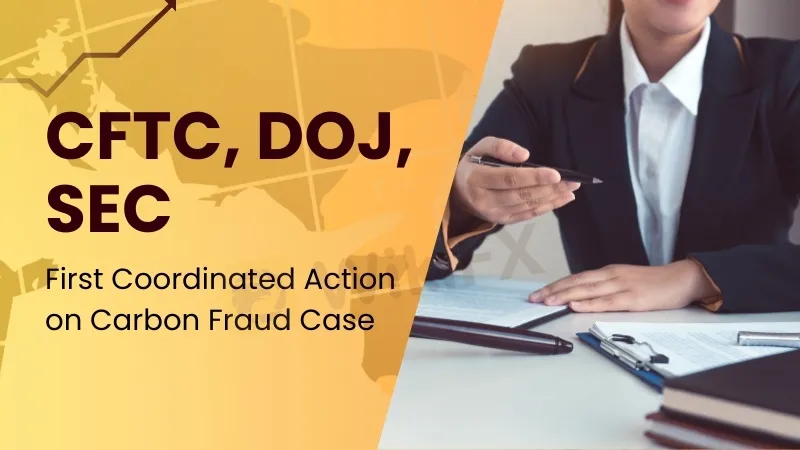简体中文
繁體中文
English
Pусский
日本語
ภาษาไทย
Tiếng Việt
Bahasa Indonesia
Español
हिन्दी
Filippiiniläinen
Français
Deutsch
Português
Türkçe
한국어
العربية
CFTC, DOJ, SEC First Coordinated Action on Carbon Fraud Case
Abstract:CFTC, DOJ, and SEC announced its first coordinated federal action against voluntary carbon market fraud involving CQC, highlighting the need for stricter regulation of carbon offsets.

The U.S. Commodity Futures Trading Commission (CFTC), Department of Justice (DOJ), and Securities and Exchange Commission (SEC) have taken their first big action in the voluntary carbon market. They are going after CQC Impact Investors LLC (CQC) and its leaders for making millions of fake carbon offsets. This case shows that the U.S. government is starting to pay more attention to carbon markets.
First Federal Action on Carbon Fraud
On October 2, 2024, the CFTC, DOJ, and SEC filed charges against CQC and its former leaders. They are accused of faking data about projects that reduce carbon emissions, leading to the creation of 6 million fake carbon offsets. This is the first time the government has taken such strong action against fraud in the voluntary carbon market. It sets a big example for the future.
The CFTC filed its case against the companys former CEO in New York, while the DOJ and SEC charged other key executives. CQC agreed to pay a $1 million fine and cancel all the fake offsets. This action shows that regulators want to make carbon markets more honest and open.
Fake Data and Greenwashing
CQCs projects were supposed to help cut pollution in sub-Saharan Africa, Asia, and Central America. They were aimed at installing clean cooking systems and energy-efficient lightbulbs. But CQC faked the results, making it seem like their projects reduced more emissions than they 2really did. This lets them create extra carbon offsets, which they used to raise $250 million from investors. This is an example of “greenwashing,” when companies pretend to help the environment more than they actually do.

Court records showed that CQC managers told their staff to submit fake data. This made it look like the projects were more successful than they were. This dishonesty hurt investor confidence and made people question the honesty of the voluntary carbon market.
Regulators Response and the Future
The CFTC, DOJ, and SECs actions show that regulators are paying more attention to the voluntary carbon market. As these markets grow, especially as companies try to meet environmental goals, there is more risk of fraud.
CQC‘s fraud was discovered in 2023 after some employees raised concerns. The company’s board confirmed the fraud, changed leadership, and told regulators about the issue. Their cooperation helped reduce their penalties.
The Investigation
This case marks a new chapter in U.S. regulation of carbon markets. The CFTC‘s Environmental Fraud Task Force, DOJ’s Fraud Section, and SECs Division of Enforcement all worked together to investigate. It shows that these agencies are committed to stopping fraud in the carbon market.
The CQC case also highlights the need for more oversight and transparency in carbon trading. As carbon markets expand, so do the risks of fraud and greenwashing. Regulators are likely to increase efforts to enforce the rules and protect the market.
Conclusion: What This Means for Carbon Market Players
The actions taken against CQC are a warning for anyone involved in the carbon market. Companies, investors, and environmental experts should see this as a reminder of the dangers of fraud. As regulations tighten, companies must ensure their projects are accurate and honest to avoid getting into legal trouble.
For regulators and environmental advocates, this case is an important step in protecting the integrity of carbon markets. As more companies join voluntary carbon offset programs, we will likely see more actions against fraud. This shows the need for stronger rules to stop greenwashing and fraud in carbon trading.
Get the latest on carbon fraud and regulatory action. Read more now on WikiFX News!

Disclaimer:
The views in this article only represent the author's personal views, and do not constitute investment advice on this platform. This platform does not guarantee the accuracy, completeness and timeliness of the information in the article, and will not be liable for any loss caused by the use of or reliance on the information in the article.
Read more

Malaysian-Thai Fraud Syndicate Dismantled, Millions in Losses Reported
The Royal Malaysia Police (PDRM) has received 26 reports concerning the Nicshare and CommonApps investment schemes, both linked to a major fraudulent syndicate led by a Malaysian citizen. The syndicate’s activities came to light following the arrest of its leader by Thai authorities on 16 December.

Malaysian Pensioner Loses RM823,000 in Fake Investment Scam
A 61-year-old man from Batu Pahat, Malaysia, has fallen victim to a fraudulent investment scheme, losing a staggering RM823,000. Local authorities revealed that the man was lured through a Facebook advertisement promoting an investment opportunity with promises of substantial returns.

WikiFX Review: Is FxPro Reliable?
Founded in 2006, FxPro is a reputable UK-based broker, trading on various market instruments. In this article, we will help you find the answer to one question: Is FxPro reliable?

SEC Approves Hashdex and Franklin Crypto ETFs on Nasdaq
The SEC has approved crypto index ETFs by Hashdex and Franklin Templeton, including Bitcoin and Ethereum, marking a milestone in crypto asset investment.
WikiFX Broker
Latest News
ASIC Sues Binance Australia Derivatives for Misclassifying Retail Clients
Geopolitical Events: What They Are & Their Impact?
Top 10 Trading Indicators Every Forex Trader Should Know
WikiFX Review: Is FxPro Reliable?
Malaysian-Thai Fraud Syndicate Dismantled, Millions in Losses Reported
Trading frauds topped the list of scams in India- Report Reveals
Why Do You Feel Scared During Trade Execution?
WikiFX Review: Something You Need to Know About Markets4you
Revolut Leads UK Neobanks in the Digital Banking Revolution
Fusion Markets: Safe Choice or Scam to Avoid?
Currency Calculator


